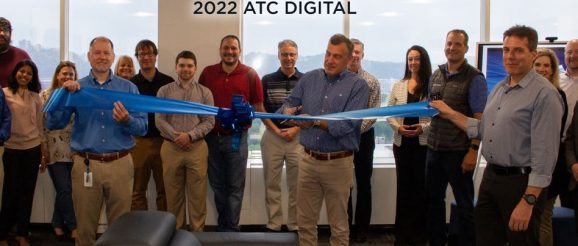American Textile Company invests in digital innovation, capacity expansion

Duquesne, Pa. – American Textile Company (ATC) recently opened a tech center in downtown Pittsburgh as part of its digital transformation, which also extends to its manufacturing business.
The tech center is located in Nova Place, home to startups and more mature companies specializing in digital innovation. The new site fosters collaboration via an open plan design, but balances openness with areas where employees can focus. With its central location in the city and its proximity to high-tech companies in robotics, AI and autonomous vehicles, the operation is situated to attract top-tier technical talent, according to Blake Ruttenberg, EVP of American Textile Company and president of its AmeriFill division.
“Our continued growth as a company created the need for additional space. As we looked at the talent we needed to help lead our digital transformation, we had a choice to expand our existing site in Duquesne, go fully remote or bring talented people together in an environment that was truly built for collaboration,” he explained.
The office has dedicated project rooms that serve as a command center for coordination and collaboration of cross-functional teams during the implementation of new software systems and in scaling business processes using technology. Most of the company’s IT staff works permanently from the office. They include product owners, developers, analysts and engineers.
“But since the space is used by cross-functional teams, on any given week you will find, team members from other departments such as operations, human resources, finance or sales,” said Ruttenberg.
ATC is also investing to support growth in its manufacturing base. It has expanded its satellite warehouse in McKeesport, Pa., to help handle periods of peak demand. The newer facility in Tifton, Ga. consolidates manufacturing and distribution in facility to improve speed and efficiency by minimizing the movement of inventory. Additional changes include the automation of the facilities in Dallas, Salt Lake City and Duquesne.
“Across our manufacturing network, we have implemented technology to automate previously manual tasks. For example, automated fiber opening and weighing has improved our precision and increased our capacity by eliminating bottlenecks. Another example is the use of voice technology in our drop-ship operation. This again improves accuracy and speed since the system directs an associate on the most efficient walk path, eliminating steps and time,” said Ruttenberg.
